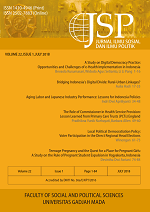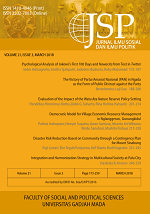Electoral System and Party Dimension Assessment in Democratic Indonesia
https://doi.org/10.22146/jsp.17956
M. Faishal Aminuddin
(1*)
(1) Lecturer of Department of Political Science, Faculty of Social and Political Sciences, Universitas Brawijaya, Malang.
(*) Corresponding Author
Abstract
Studies on election and its consequences on political parties in new democratic countries have often paid attention to cover the impacts imposed on the party system. This paper aims to examine the extent of the electoral system in influencing political parties in terms of improving their function or performance. This study will apply an analytical framework initiated earlier by webb and White (2009) on party dimension in the new democracy by looking at the Indonesian case. In this framework, there are saveral generic factors in the relation between the electoral system and the party's function such as ideological polarization, party constituency base, fractionalization in parliament and vote distribution. This study found that any changes applied to the electoral system in democratic Indonesian bear little or insignificant impact on political party performance. In addition, this study made use of the national election result dataset and calculated the variables with correlated formula which were subsequently analyzed to obtain an empirical explanation.
Keywords
election; political party; party dimension; Indonesia.
DOI:
https://doi.org/10.22146/jsp.17956
Article Metrics
Abstract views : 5020
|
views : 5431
Refbacks
There are currently no refbacks.
Copyright (c) 2017 JSP (Jurnal Ilmu Sosial dan Ilmu Politik)
This work is licensed under a
Creative Commons Attribution-NonCommercial-NoDerivatives 4.0 International License .
<div class="statcounter"><a title="Web Analytics" href="http://statcounter.com/" target="_blank"><img class="statcounter" src="//c.statcounter.com/10932543/0/2e122c85/0/" alt="Web Analytics"></a></div> <div class="statcounter"><a title="Web Analytics Made Easy - StatCounter" href="http://statcounter.com/" target="_blank"><img class="statcounter" src="//c.statcounter.com/10932543/0/2e122c85/0/" alt="Web Analytics Made Easy - StatCounter"></a></div> View My Stats























